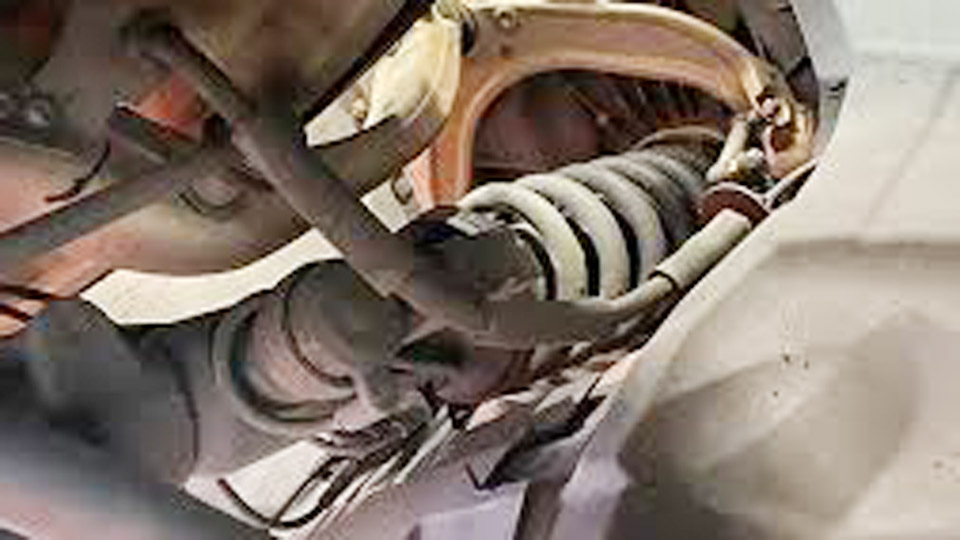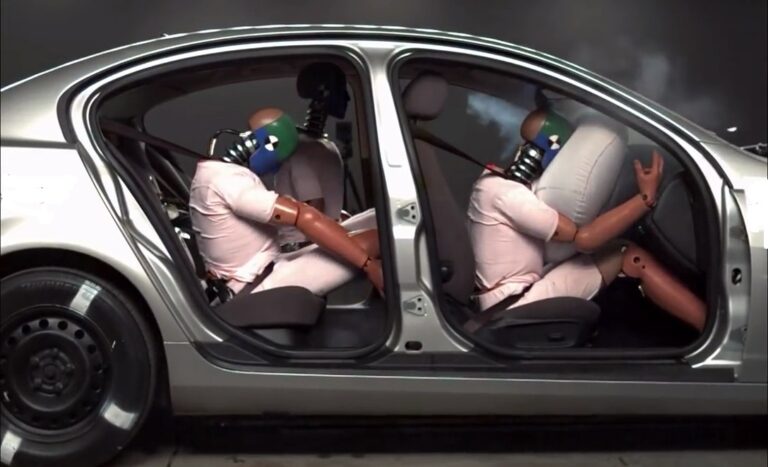“Why Does My Car Make Loud Noise When I Turn?.” I’ll never forget the first time I heard a loud noise when turning my old Honda Civic. It was a jarring clunk or screech that made me wince, wondering, “Why does my car make a loud noise when I turn?” It happened pulling into a parking lot, and I immediately feared the worst—big repair bills or a breakdown.
After years of working on my own cars and helping friends diagnose similar issues, I’ve learned these noises are often fixable with some detective work. Let’s troubleshoot this together, like we’re in my garage, so you can pinpoint the problem and get your car quiet again.

Image by beckerservicecenter
What That Loud Noise Might Mean – Why Does My Car Make Loud Noise When I Turn?
A loud noise during turns usually points to trouble in your car’s steering, suspension, or drivetrain. It’s not always a disaster, but it’s a sign something needs attention. I’ve chased down everything from squealing belts to failing joints, and each issue has a unique sound or trigger. Understanding what’s causing the racket will save you stress and money. Let’s explore the most common culprits I’ve encountered and how to identify them.
Why Turning Triggers the Noise
Turning stresses components like the steering system and front wheels, exposing wear or damage. My Civic’s noise only showed up during sharp turns, like when I was parking. That’s because parts like CV joints or power steering systems work harder when you turn, revealing issues that stay quiet when driving straight. Noticing when the noise happens—sharp turns, low speeds, or both—helps narrow it down.
Common Causes of Loud Noises When Turning
Here are the issues I’ve seen most often in my cars and those of friends. Each has distinct symptoms, and I’ll share how I figured them out.
Worn CV Joints
Constant Velocity (CV) joints are critical for front-wheel-drive or all-wheel-drive cars, transferring power to the wheels while allowing them to turn. When they wear out, they often make a loud clicking or clunking noise, especially during tight turns.
My Civic had this issue—a torn CV boot let grease leak out, and the joint started clicking loudly when I turned into my driveway. I spotted grease splattered around the wheel well, a dead giveaway.
Why it matters: A failing CV joint can break, leaving you stranded. I replaced mine before it got that bad, but waiting too long is risky.
Power Steering Problems
Low power steering fluid or a failing pump can cause a loud whining or screeching noise when turning. I helped a friend with a Toyota that screeched every time she turned the wheel. We checked the fluid reservoir under the hood, and it was nearly empty. Topping it off quieted the noise, but a leak meant it needed a mechanic’s attention.
Why it matters: Without enough fluid, the pump can burn out, making steering harder and more dangerous. Checking fluid levels is an easy first step.
Worn Wheel Bearings
Wheel bearings let your wheels spin smoothly, but when they wear out, they can produce a loud grinding or roaring noise, especially when turning. My brother’s SUV had a deep growl during left turns, and jacking up the wheel revealed play in the bearing. It was a clear sign it needed replacing.
Why it matters: A bad bearing can cause wheel wobble or even detach, which is a safety hazard. If you hear grinding, don’t delay checking it.
Faulty Tie Rod Ends
Tie rod ends connect your steering to the wheels. When they’re worn or loose, they can cause a loud clunking noise during turns. I diagnosed this on a neighbor’s car—the noise happened at low speeds, like turning into a parking spot. A quick inspection showed the tie rod end wobbling when tugged.
Why it matters: Loose tie rods mess with steering precision and can cause uneven tire wear or loss of control. Fixing them early prevents bigger issues.
Dry or Damaged Ball Joints
Ball joints are part of your suspension, allowing smooth movement. When they’re dry or worn, they can squeak or clunk loudly during turns. My old truck had a squeaky ball joint that I quieted temporarily with grease, but replacement was the long-term fix.
Why it matters: Worn ball joints can affect handling or even break, causing suspension failure. Regular greasing can extend their life.
Loose or Damaged Belts
A loose or worn serpentine belt can squeal loudly when turning, as the power steering pump demands more effort. I once ignored a faint squeal in my wife’s car, thinking it was minor. It got louder during turns, and tightening the belt fixed it.
Why it matters: A slipping belt can lead to power steering or alternator failure. Checking belt tension is a quick way to rule this out.
How to Diagnose the Noise
Finding the source of the noise takes patience, but it’s doable. Here’s how I approach it, based on my driveway troubleshooting sessions.
Listen for Clues
Pay attention to the noise’s type and timing. Is it a click, clunk, screech, or grind? Does it happen only during sharp turns or at low speeds? My Civic’s CV joint clicked rhythmically during tight turns, while my brother’s bearing growled steadily. Drive slowly in a parking lot, turning both directions, to isolate the sound.
Check Under the Hood and Wheels
Pop the hood to inspect the power steering fluid and belts. Low fluid or a loose belt is an easy fix. Jack up the car (use jack stands for safety!) and wiggle each front wheel. If it moves excessively, the bearing or tie rod might be bad. I found my truck’s ball joint issue by checking for play in the suspension.
Inspect CV Joints
Look at the CV boots near the front wheels. Torn boots or grease splatter, like I saw on my Civic, point to a failing joint. If the boot is intact but the noise persists, the joint might still be worn. A mechanic can confirm with a closer look.
Test Drive with Purpose
Take a short drive and vary your turns—sharp, gentle, left, and right. I diagnosed a tie rod issue once because the clunk only happened turning right at low speeds. Note if the noise changes with speed or road conditions to rule out debris or confirm a mechanical problem.
Fixing the Loud Noise
Once you’ve pinpointed the cause, here’s how I’ve tackled these issues, with tips to keep it simple and safe.
Replacing a CV Joint
A bad CV joint usually needs a new axle. I replaced one on my Civic with a friend’s help. We jacked up the car, removed the wheel, and unbolted the axle. A rebuilt axle cost me $120, and the job took a weekend. Shops charge $300-$500, so DIY saved money, but it’s not for beginners. If you’re unsure, a mechanic is the safer bet.
Why it matters: A new axle stops the noise and prevents a breakdown. Delaying can damage other drivetrain parts.
Topping Off Power Steering Fluid
For a whining or screeching noise, check the power steering fluid. I found my friend’s Toyota reservoir low, so we added fluid (check your manual for the right type). The noise stopped, but we had a mechanic fix the leak later. If the fluid keeps dropping, you’ve got a leak somewhere.
Why it matters: Proper fluid levels keep steering smooth and protect the pump. It’s a cheap fix if caught early.
Replacing Wheel Bearings
Bad bearings need replacement. I helped my brother swap one on his SUV—remove the wheel, brake caliper, and hub, then press out the bearing. Parts cost $80, but it’s a tough job without a press. I’d recommend a shop unless you’re experienced, as it’s a precise task.
Why it matters: A new bearing restores safe wheel movement. Driving on a bad one risks serious damage.
Fixing Tie Rod Ends
Loose tie rods can be tightened or replaced. I replaced one on my neighbor’s car for $40 in parts. Jack up the car, remove the old tie rod end, and install the new one. An alignment afterward is a must—I skipped it once, and my tires wore unevenly.
Why it matters: Tight tie rods ensure precise steering and prevent tire wear. It’s a relatively affordable fix.
Greasing or Replacing Ball Joints
If ball joints are dry, greasing them can stop the noise temporarily. I used a grease gun on my truck, which worked for months. If they’re worn, replace them ($30-$60 each). This job is tricky, so a mechanic might be best if you’re not confident.
Why it matters: Lubricated or new joints keep your suspension stable and quiet. Ignoring them can lead to handling issues.
Tightening or Replacing Belts
A squealing belt might just need tightening. I fixed my wife’s car by adjusting the serpentine belt tensioner. If it’s worn or cracked, replace it ($20-$50). Check your manual for the right belt and tension specs.
Why it matters: A proper belt ensures power steering and other systems work smoothly. It’s a quick, cheap fix.
Comparison of Common Causes and Fixes
Here’s a table I use to explain these issues to friends, comparing symptoms, fixes, and costs based on my experience.
| Cause | Symptoms | Fix | Cost (DIY) | Difficulty |
|---|---|---|---|---|
| CV Joint | Loud clicking in tight turns, grease leaks | Replace axle | $100-$200 | Moderate |
| Power Steering Issue | Whining/screeching, hard steering | Top off fluid, fix leak | $10-$50 | Easy |
| Wheel Bearing | Grinding/roaring, wheel play | Replace bearing | $50-$150 | Hard |
| Tie Rod End | Clunking at low speeds, loose steering | Tighten or replace | $20-$60 | Moderate |
| Ball Joint | Squeaking/clunking, poor handling | Grease or replace | $20-$60 | Moderate |
| Loose/Worn Belt | Squealing, worse during turns | Tighten or replace belt | $20-$50 | Easy |
This table helps me pick the right fix based on the noise and budget. It’s a quick reference for prioritizing repairs.
Preventing Loud Noises in the Future
Prevention is easier than repairs. Here’s what I do to keep my cars quiet.
Regular Inspections
Check CV boots, fluid levels, and belts every oil change (every 5,000-7,500 miles). I caught a torn boot early on my truck, saving the joint. Routine checks spot issues before they get loud.
Smooth Driving
Avoid sharp, jerky turns, which stress CV joints and bearings. I used to whip my Civic into parking spots, and it likely shortened the CV joint’s life. Gentle driving extends component life.
Maintenance Schedules
Follow your car’s maintenance schedule for greasing suspension parts and checking fluids. I grease my truck’s ball joints yearly, which keeps them quiet. Your owner’s manual has the details.
Why I Love Solving Car Problems
Figuring out a car’s noises is like solving a puzzle. The first time I fixed my Civic’s CV joint, I felt like a detective cracking a case. It’s not just about saving money—though I’ve saved plenty—it’s about knowing your car and keeping it reliable. Helping friends with their cars feels even better, like passing on a bit of confidence.
Quiet Your Car and Drive Worry-Free
A loud noise when turning your car can be intimidating, but it’s often a straightforward fix. From CV joints to power steering fluid, I’ve tackled these issues myself and learned they’re manageable with the right approach.
Start by listening to the noise, inspecting key parts, and trying the fixes I’ve shared. You’ll save money and gain peace of mind knowing your car is in good shape. Grab a wrench or flashlight and dive in—you’ll be amazed at what you can do!
Frequently Asked Questions
What’s causing the loud clicking when I turn my car?
A loud clicking during turns often points to a worn CV joint, especially in front-wheel-drive cars. I’ve seen this in my Civic—check for torn boots or grease leaks near the front wheels to confirm.
Why does my car screech when I turn the steering wheel?
Screeching usually means low power steering fluid or a loose belt. I fixed a friend’s car by topping off the fluid, but a leak might need a mechanic’s attention.
Is it safe to drive with a loud noise when turning?
It depends. A loose belt or low fluid is less urgent, but a bad CV joint or bearing can fail. I drove a week with a clicking joint, but it’s risky—get it checked soon.
How much does it cost to fix a noisy CV joint?
Replacing a CV joint axle costs $100-$200 if you do it yourself. I paid $120 for parts on my Civic. Shops charge $300-$500, depending on the car.
Can I prevent these noises from happening again?
Yes, regular maintenance helps. I check fluids, belts, and CV boots every oil change and drive smoothly to reduce wear. It’s kept my cars quieter for years.




